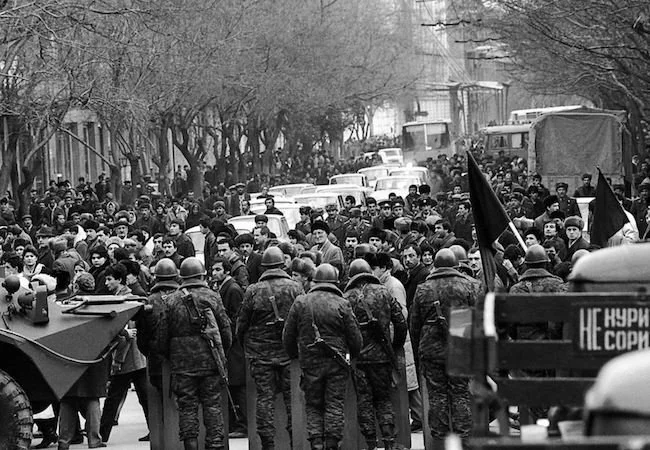Black January [Extract from Hammer, Sickle ]
On 20 January 1990, our TV was not working. No matter what Nana and I did the screen stayed blank. I was off school because my Nana decided it was not safe for me to go. Due to the anti-Soviet protests, the buses were no longer operating a reliable service and would sometimes stop long before our area. Although I was willing to walk, many of the teachers and pupils were absent or late, so lessons were usually disrupted.
That morning, Nana decided we should go to the open-air bazaar since I paced the house like a caged animal. She picked up several bags, put her coat on and waited for me impatiently at the door. Were we safe walking to the bazaar for half an hour, I wondered?
[Extract from Hammer, Sickle & Broom]
‘It was a cold January morning. I did not really want to be at the bazaar. It was nothing new. I dragged along behind Nana, lost in thoughts about the current political situation, as she skilfully examined all the local farm produce on sale. There were mounds of fruit and vegetables: crisp apples, potatoes and onions alongside more expensive items, such as walnuts, chestnuts and pomegranates. Everything was neatly arranged and every stall holder eager to please, until the moment you said ‘no thank you’, when their tired faces fell back into a frown.
Despite myself, the sights, scents and sounds gradually worked their magic on me. Here in the fresh winter air, life was bustling on, as if everything was still normal. Nana bought me a couple of wrinkled apples, as a reward for being her donkey. As I munched the soft flesh, even the traders’ loud shouting to attract customers felt almost welcome. It was fun to watch Nana stop from time to time and haggle with a vendor.
‘How much do you charge for potatoes?’
‘Five rubles, Khala, they were grown in Dashkasan. Fluffy and soft, you won’t regret buying them.’ The young man pulled his hat down over his ears and rubbed his gloved hands.
‘Do you think I was born yesterday? These are not from Dashkasan! Tell your tales to someone else.’
‘Khala, in the name of Allah, they are from Dashkasan! But, just for you, they are four rubles!’ Nana shook her head. Smiling, she started to turn away, but the youth would not give up. ‘Three and a half, if you take the whole bucket!’ he called out.
My heart sank as Nana reached for her purse. The straps of the shopping bags were already starting to cut into my hands. My arms felt painfully stretched, my shoulders were drooping with tiredness. How would I carry that bucket as well? I reached out my hand, about to try and dissuade her, when the buzz of normality around us stopped.
A long procession of men slowly marched into the bazaar carrying huge bunches of red carnations. Nana and I had no idea why. People often gifted each other red carnations, but we had never seen so many being carried like this before.
‘Who will give us more?’ one of the men shouted.
Several of the traders came to hand more bundles of the blood red flowers to these men as they moved through the bazaar.
As an elder lady, Nana could ask questions of anyone, even men. She waylaid one of the carnation gatherers by grabbing his sleeve.
‘What are all those for?’ The young man’s lean sad face looked concerned for her.
‘You haven’t heard, Khala? I’m so sorry to be the one to tell you.’
‘Tell me what?’ Nana replied.
He swallowed and said: ‘The Soviets. They killed hundreds of brave Azebaijani people in Baku, just a few hours ago. We are gathering the flowers to mourn them…’
Nana gasped and let go of his sleeve to cover her mouth.
‘Everyone is being asked to donate red carnations to mark the loss of innocent blood.’
‘That is why the TV isn’t working?’ Nana murmured as the young man left to join his fellow collectors.
‘Yes,’ answered a woman next to us. ‘The Soviets blew up the power lines to the TV and radio stations, but they couldn’t silence everyone. People came from Baku, I heard. Those bastards killed innocent women and children, as well as men.’
‘Why?’ Nana croaked.
‘Because of the nationalists, that’s what I think. It’s all the Popular Front’s fault. Now Moscow sent tanks to stop the demonstrations. Some people lay on the frosty ground in protest, to stop the tanks from entering the city. The tanks didn’t stop…’
Her words chilled me to the bone. Mama was an active member of the Popular Front. Laying in front of a tank and saying ‘over my dead body’ was exactly the kind of thing Mama and my father would do. Nana was clutching my already burdened arm. I realised she too was fighting back tears. As I took some slow, cool breaths to steady myself, I felt all hope of normality sucked from the air.
‘We’d better go, Nana,’ I heard myself saying. I sounded so calm. For once, without comment, Nana let me lead her home.”
This time in my life was history in making. If you’d like to read more, here’s the link to my book.
P.S. With thanks to Google images.

